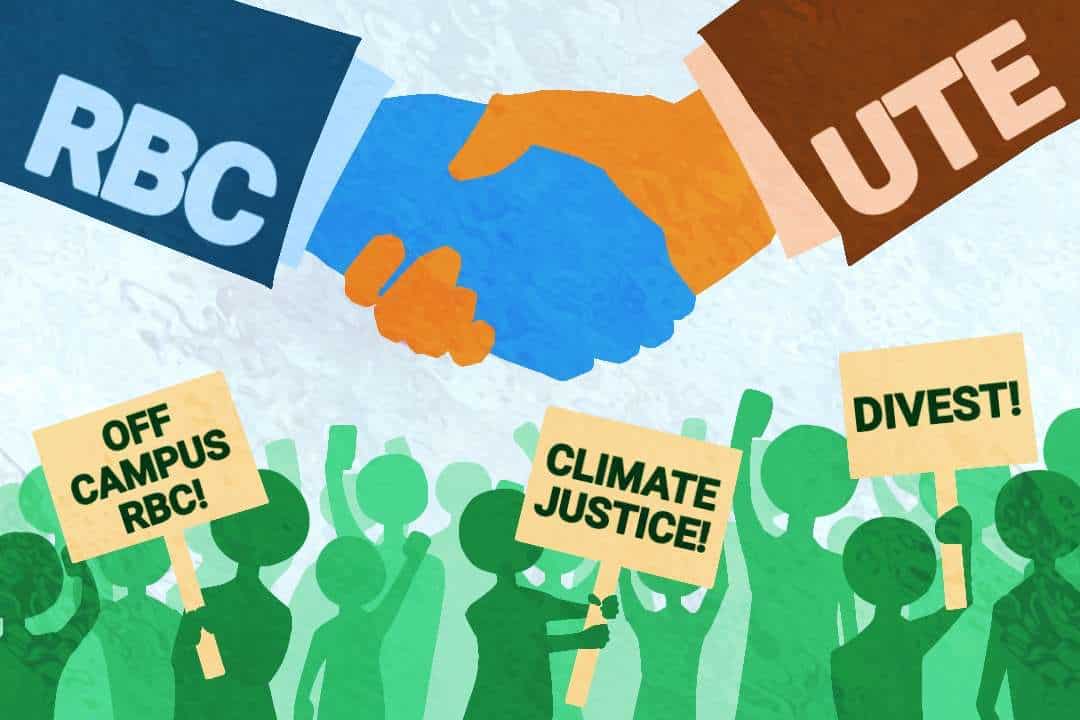On October 11, the University of Toronto Entrepreneurship (UTE) hosted a panel to launch the Royal Bank of Canada (RBC) Innovation Challenge — a program for hopeful student entrepreneurs to develop startup plans and compete for $100,000 in total venture funding. RBC will be providing funding and business expertise to the participants over the course of the challenge. The theme for this year’s challenge is “Tech for a Greener Future.”
The challenge began not long after the Competition Bureau of Canada opened an official investigation into RBC’s alleged misrepresentation of its climate policy in its marketing practices, as reported by the Financial Times. The Competition Bureau is an independent law enforcement agency that promotes competitive behaviour within the Canadian economy.
Six people supported by environmental groups like Ecojustice and Stand.earth claim that the bank is contradicting the Paris Agreement — an international treaty on climate change — and is not on track to achieve net-zero emissions by 2050, despite what its advertising states. RBC has denied the allegations. The Competition Bureau has neither confirmed nor denied them at this time.
During the panel, a group of audience members interrupted the speakers to protest the UTE’s continued partnership with RBC, as part of a larger campaign to stop RBC’s actions on campus altogether.
Interrupted by Climate Justice UofT
During the panel, RBC panellists Mark Beckles, Alanna La Rose, and Krishna Ruthnum were discussing their work on the bank’s climate policy when an audience member interrupted them, crying out, “This is greenwashing!” Two rows of people stood up. Audience members, including students, professors, and faculty deans — Melanie Woodin of Arts and Science and Christopher Yip of Applied Science and Engineering — witnessed the demonstration.
“Greenwashing” is a term coined by environmentalist Jay Westerveld in 1986. It refers to publicity materials that portray organizations as environmentally responsible, when they are actually engaging in environmentally destructive practices.
The demonstrators unfurled a banner reading “Fund Futures not Pipelines.” The audience member said, “I can’t just sit here and let you present this event without acknowledging that RBC is the fifth largest funder of fossil fuels.”
When the panel was interrupted, the RBC economist who was moderating acknowledged the demonstrators’ claims but maintained that they would continue the panel as scheduled. The demonstrators refused. After some back and forth, the panellists left the room. An audience member exclaimed to the demonstrators that their time was being wasted. Then, another called on the room to raise their hands if they wanted the panel to continue on; a majority followed suit.
Eventually, the demonstrators escorted themselves out of the building. The RBC panellists reentered, and the panel resumed as normal. The demonstrators and their complaints were not further acknowledged.
Erin Mackey, the demonstration’s spokesperson, is a co-coordinator at Climate Justice UofT. She is majoring in political science and environmental studies. “We, at Climate Justice UofT, don’t want RBC on our campus, if they’re going to continue to mislead the public, and they’re going to continue to expand fossil fuels,” she said.
UTE’s response
UTE, which hosted the panel, is the university’s support network for student and faculty entrepreneurship, and has a rather robust partnership with RBC. The bank funds a number of UTE scholarships and programs for U of T entrepreneurs, including the Innovation Challenge. RBC also facilitated the development of the OnRamp – UTE’s event and work space for students — the RBC name is displayed on one of the walls.
UTE director Jon French explained in an interview with The Varsity that “from our perspective, RBC is not only a long-standing partner, but also an organization that does have a climate strategy. It’s published, it’s well articulated, it has measurable goals, many of their objectives are consistent with University of Toronto objectives.”
Following the demonstration, French noted in an email to The Varsity that “we were pleased to see a healthy and respectful exchange between activists and the panellists and other students at the event.”
The challenge
French explained in an interview with The Varsity that challenge judges will be looking for pitches that leverage technology and data to create impactful climate solutions but are also viable on the market. “We need to figure out ways to bring [the idea] to market and… provide the capital for it. We hope that the solutions are impressive,” said French.
November 13 is the deadline for teams to submit their applications. Project development will take place over the next three months, with the winners being announced at the end of January 2023.
Noah Cazabon, a student considering participating in the challenge, explained in an interview with The Varsity that he had come to the launch panel with some reservations about RBC’s sponsorship of the event. Cazabon is a third-year student majoring in biology and urban studies.
He recounted that he had been getting frustrated at the RBC panellists’ discussion of their climate strategy, which he described as “ironic”. He noted that it was “relieving and refreshing to hear” Climate Justice UofT bring up RBC’s position in the fossil fuel industry. He also added, “I would have appreciated it if [the panellists] did address it.” After the event, he is still debating whether or not to participate in the challenge.


